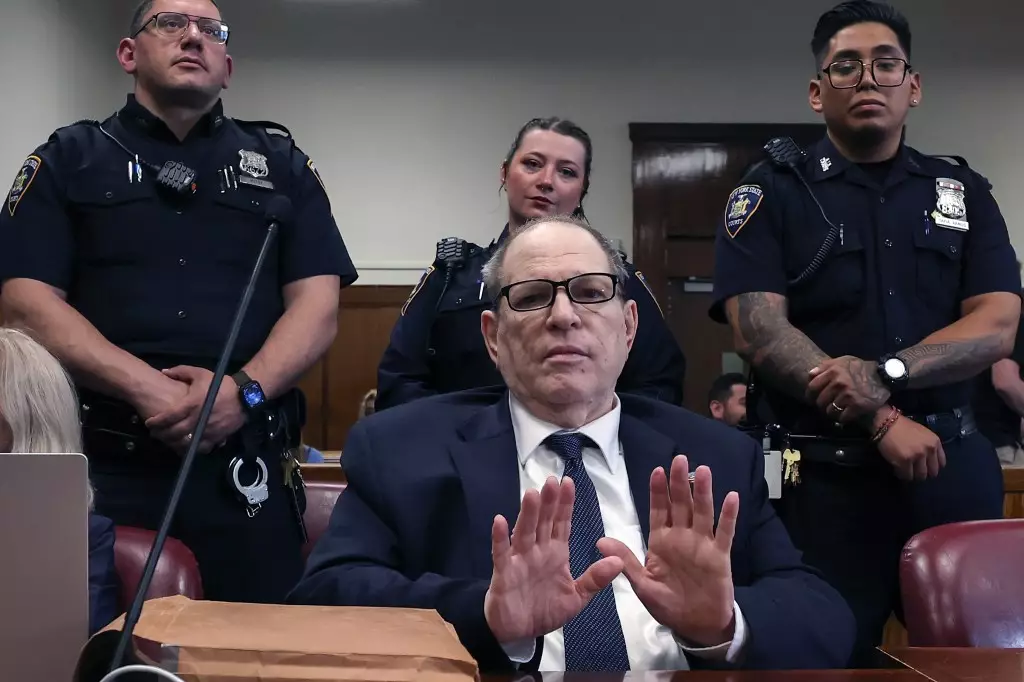The saga surrounding Harvey Weinstein epitomizes a disconcerting intersection of fame, power, and accountability. Once heralded as a titan of Hollywood, Weinstein’s name has transformed into a cautionary tale—an emblem of systemic abuse that has marred the entertainment industry. As he faces the repercussions of numerous allegations of sexual misconduct and rape, a more complex narrative emerges: one of a once-mighty figure now maneuvering through legal mazes with a strategy that raises important ethical questions. Despite his legal team’s insistence on caution, the choice to forgo personal testimony in his New York retrial encapsulates a broader issue: how do we weigh the truth against public perception and institutional power dynamics?
Justice vs. Public Sentiment
Weinstein’s defense strategy exemplifies a calculated evasion—one that relies heavily on the scrutiny that personal testimony invites. His attorney, Arthur Aidala, frames interactions with his accusers as mutual and consensual; this assertion appears not simply as a legal defense but as a reflection of a profound misunderstanding of the changes in societal attitudes since the #MeToo movement gained traction. In a post-2017 landscape, where public sentiment increasingly rejects silencing the voices of survivors, Weinstein’s insistence on proclaiming innocence might seem desperate—an echo of a bygone era where power could silence the vulnerable.
The notion that justice must delineate between the immoral and the illegal brings forth an unsettling dichotomy: can a socially lauded figure argue his way out of severe accusations simply because he commands a vocal following? This dilemma becomes acutely pressing when Weinstein engages in a public relations campaign even as he remains silent in court. His recent interview with Candace Owens—the controversial figure who has faced her own share of backlash— underscores a pivot to audiences eager for narratives that challenge established norms. Here, Weinstein steps beyond a mere defendant and assumes the role of victim in his own story, rebranding himself in light of public sympathy.
Public Relations over Judicial Accountability
The irony is palpable: Weinstein, who once wielded formidable influence, now resorts to a guerrilla PR strategy in lieu of direct engagement with judicial processes. As his legal proceedings unfold, one cannot help but question the validity of a system that allows an alleged perpetrator—archival evidence of physical and emotional wrongdoings notwithstanding—to shape his public image so deftly, even from behind bars. His campaign claims victimhood while attempting to cultivate a narrative that underplays the systematic nature of his alleged actions. The question remains: do these attempts to sway public opinion impede true justice, or are they an inevitable byproduct of a system that intertwines fame with legal proceedings?
The Consequences of Mediated Justice
The pivot towards celebrity-driven narratives in legal cases—especially those handling sexual assault—calls for scrutiny into the fabric of our legal discourse. Is it possible for the courts to truly serve justice when they are overshadowed by the colossal media machinery that glorifies or vilifies figures like Weinstein? The juxtaposition of his opportunistic media engagement with the gravity of his crimes presents an unsettling outlook: the continuous cycle of power and privilege threatens to overshadow true accountability.
As deliberations in Weinstein’s retrial loom, one can only hope that the jury remains unclouded by the veneers of media theatrics and celebrity culture. They are tasked not just with adjudicating guilt or innocence based on the evidence presented, but also with navigating an intricate cultural landscape that has evolved since the days of Weinstein’s unchecked influence. We must grapple with a sad reality: justice in its truest form may still be out of reach, ensnared in an environment that elevates the powerful while the voiceless continue to strive for truth in silence.

